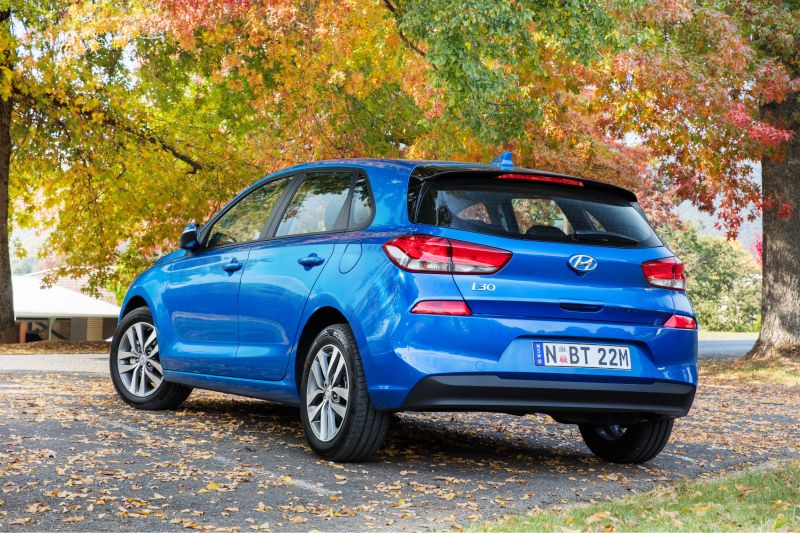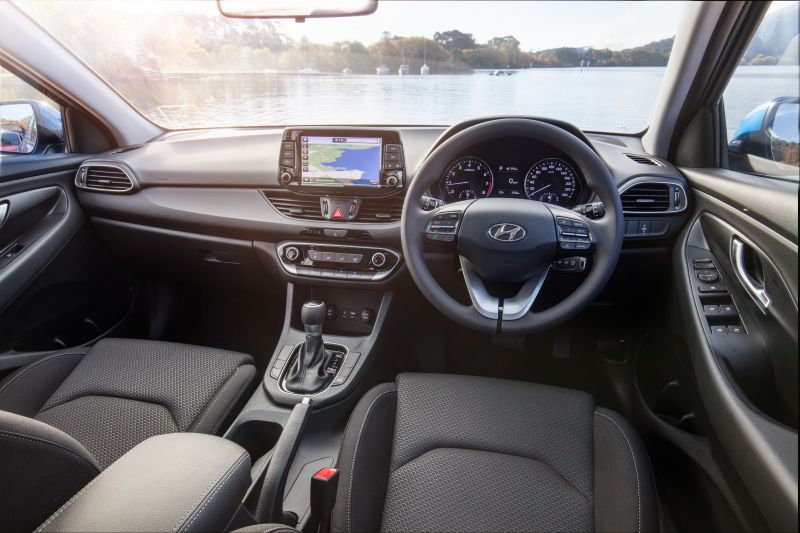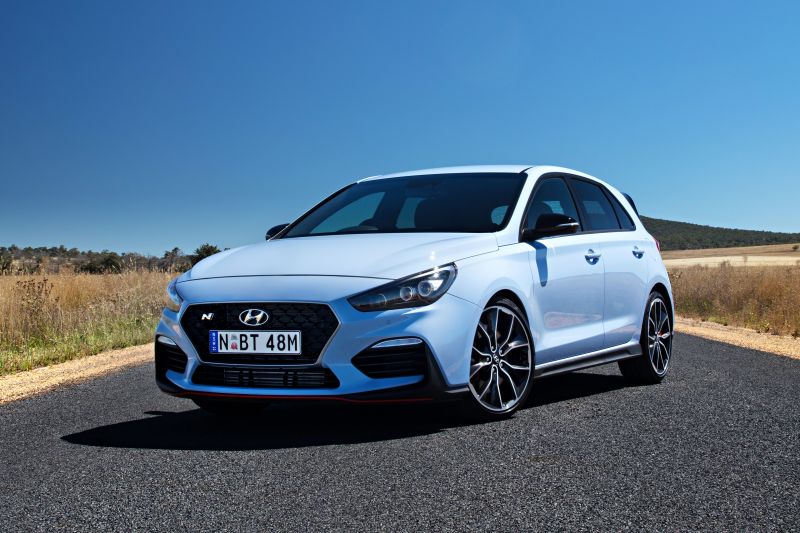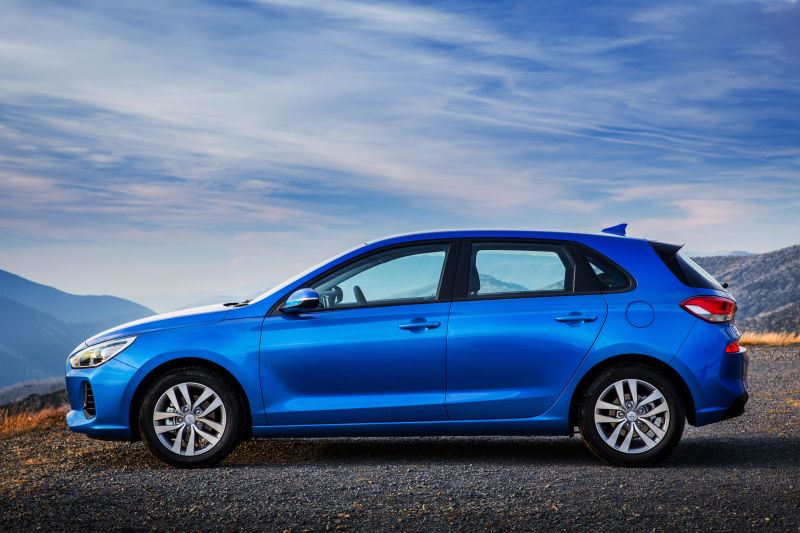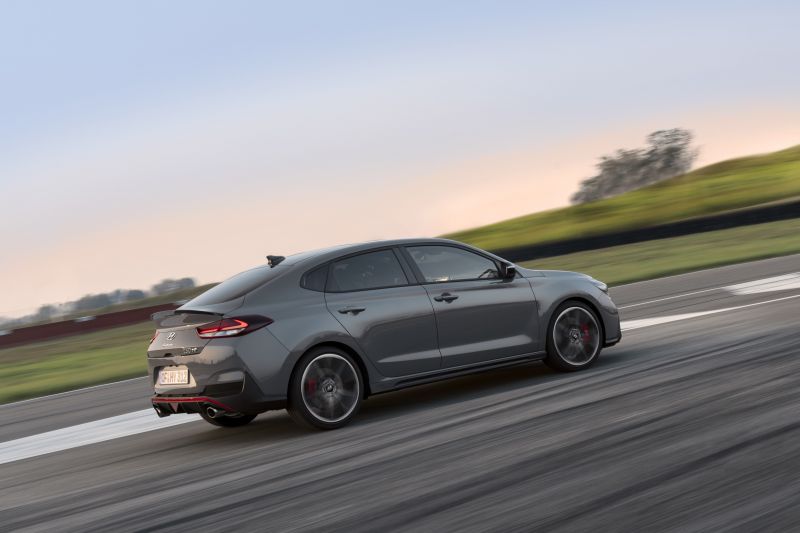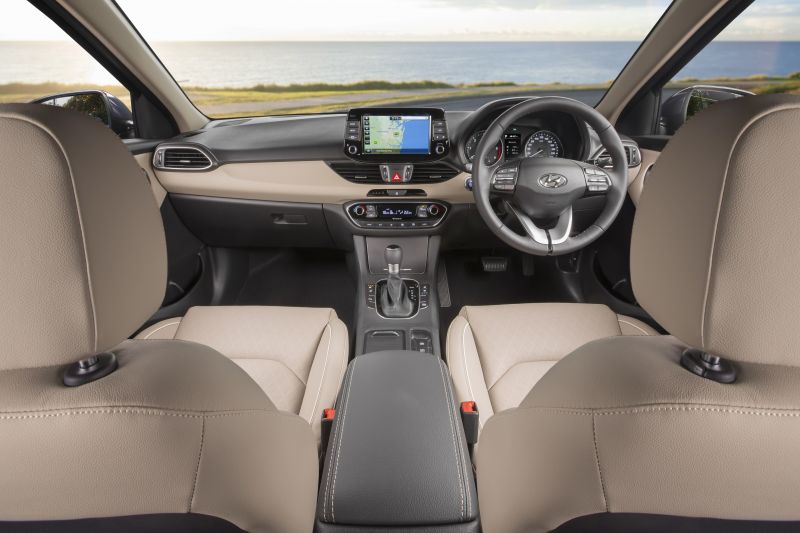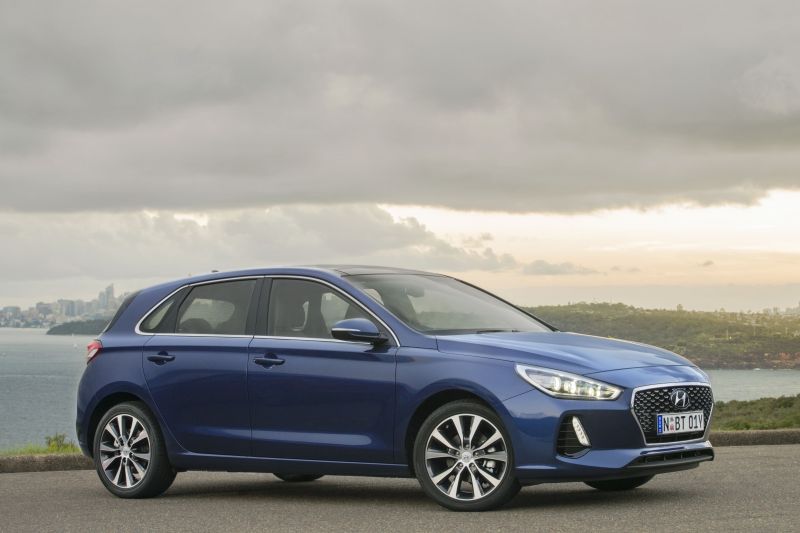The 2020 Hyundai i30 is available in eight different trim levels, with prices ranging from $20,240 before on-road costs for the base Go 2.0-litre with a manual transmission to $45,490 before on-road costs for the N Fastback with Luxury Pack.
The i30 is Hyundai’s rival to small hatches like the Mazda3 and Toyota Corolla and complements the sedan-only Elantra.
This is the third generation of i30, first introduced in 2017, and a substantial refresh is due this year.
Pricing
- 2020 Hyundai i30 Go 2.0 manual: $20,240
- 2020 Hyundai i30 Active 2.0 manual: $21,340
- 2020 Hyundai i30 Go 2.0 auto: $22,540
- 2020 Hyundai i30 Active 2.0 auto: $23,640
- 2020 Hyundai i30 Go diesel auto: $25,240
- 2020 Hyundai i30 Active diesel auto: $26,340
- 2020 Hyundai i30 N-Line 1.6T manual: $26,740
- 2020 Hyundai i30 Elite 2.0 auto: $28,040
- 2020 Hyundai i30 N-Line 1.6T auto: $29,740
- 2020 Hyundai i30 Elite diesel auto: $30,740
- 2020 Hyundai i30 Premium 2.0 auto: $33,040
- 2020 Hyundai i30 N-Line Premium 1.6T auto: $35,240
- 2020 Hyundai i30 Premium diesel auto: $35,740
- 2020 Hyundai i30 N: $40,990
- 2020 Hyundai i30 N Fastback: $42,490
- 2020 Hyundai i30 N with Luxury Pack: $43,990
- 2020 Hyundai i30 N Fastback with Luxury Pack: $45,490
All prices are before on-road costs.
Engines
The 2020 Hyundai i30 is available with four engines.
The Hyundai i30 Go, Active, Elite and Premium come standard with a naturally-aspirated 2.0-litre four-cylinder engine producing 120kW and 203Nm. This engine is mated to either a six-speed manual or six-speed automatic transmission.
Optional on these models is a 1.6-litre turbo-diesel four-cylinder producing 100kW and 300Nm. It’s mated to a seven-speed dual-clutch automatic transmission.
Standard on the i30 N-Line and i30 N-Line Premium is a turbocharged 1.6-litre four-cylinder engine producing 150kW and 265Nm and mated to a six-speed manual transmission. A seven-speed dual-clutch automatic transmission is optional on the i30 N-Line.
The i30 N and i30 N Fastback use a turbocharged 2.0-litre four-cylinder engine producing 202kW and 353Nm (378Nm on overboost). The only transmission is a six-speed manual.
Fuel Economy
The 2020 Hyundai i30 2.0-litre consumes 7.3L/100km on the combined cycle when equipped with the manual transmission and 7.4L/100km when equipped with the automatic.
The optional 2.0-litre turbo-diesel four uses 4.7L/100km on the same test.
When equipped with the turbocharged 1.6-litre and six-speed manual, the i30 consumes 7.5L/100km on the combined cycle.
Opting for the dual-clutch automatic brings this down to 7.1L/100km.
The i30 N’s turbocharged 2.0-litre consumes 8.0L/100km.
All petrol-powered i30 models run on 91RON regular unleaded fuel except for the i30 N which requires 95RON premium unleaded.
Dimensions
The 2020 Hyundai i30 Go, Active, Elite and Premium measure 4340mm long, 1455mm tall and 1795mm wide.
The Hyundai i30 N-Line and N-Line Premium measure 4345mm long, 1453mm tall and 1795mm wide.
The Hyundai i30 N hatchback measures 4335mm long, 1447mm tall and 1795mm wide, while the N Fastback measures 4455mm long, 1419mm tall and 1795mm wide.
The Hyundai i30 has 395L of volume in its cargo area, increasing to 1301L with the rear seats folded.
The Hyundai i30 N has slightly less volume at 381L and 1287L, respectively, while the i30 N fastback has slightly more room at 436L and 1337L.
Safety
When the Hyundai i30 was tested by ANCAP in 2017, it received a rating of five stars.
That rating was based on a frontal offset score of 14.01 out of 16 and a side impact score of 16 out of 16. Whiplash and pedestrian protection were rated Good and Acceptable, respectively.
The 2020 Hyundai i30 Go and Active come standard with anti-lock brakes and front, front-side and curtain airbags as well as a driver’s knee airbag.
Autonomous emergency braking and forward-collision warning are only available as part of the $1750 Smartsense Safety Pack and only on models with an automatic transmission.
The Smartsense Safety Pack also includes lane-keeping assist, blind-spot monitoring, rear cross-traffic alert and adaptive cruise control.
The pack is standard on all other models, though the N-Line and N models miss out on rear cross-traffic alert and blind-spot monitoring.
Standard Equipment
The 2020 Hyundai i30 Go comes with the following standard features:
- 8.0-inch touchscreen infotainment system
- Android Auto and Apple CarPlay
- Cruise control
- 16-inch steel wheels
- Reversing camera
- Six-speaker sound system
- LED daytime running lights
The next rung up is the i30 Active which adds the following:
- Satellite navigation
- 16-inch alloy wheels
- Rear parking sensors
- DAB+ digital radio
- Eight-speaker Infinity premium sound system
- Leather-wrapped steering wheel and shift knob
- Power-folding exterior mirrors
The i30 Elite adds the following features:
- Rear air-conditioning vents
- 17-inch alloy wheels
- Leather seats
- Dual-zone climate control
- Rain-sensing wipers
- Proximity entry with push-button start
- Qi wireless phone charging
- Auto up/down windows
- Blind-spot monitoring
- Rear cross-traffic alert
- Autonomous emergency braking
- Forward-collision warning
- Lane-keeping assist
- Adaptive cruise control
The i30 Premium adds the following features:
- Front parking sensors
- LED headlights and taillights
- Heated and ventilated front seats
- Panoramic sunroof
- Seven-speaker Infinity premium sound system
- 10-way power driver’s seat
The i30 N-Line drops back to the Active’s features list but adds:
- Turbocharged 1.6-litre four-cylinder engine
- 18-inch alloy wheels
- Michelin Pilot Sport 4 tyres
- Proximity entry with push-button start
- Dual-zone climate control
- LED taillights
- Qi wireless phone charging
- Leather seats
- N-Line appearance package
The i30 N-Line Premium adds the following features:
- Front parking sensors
- LED headlights
- Panoramic sunroof
- Heated and ventilated front seats
- 10-way power driver’s seat
- Seven-speaker Infinity premium sound system
The i30 N and i30 N Fastback drop the i30 N-Line Premium’s additional features but add:
- Turbocharged 2.0-litre four-cylinder engine
- LED headlights
- Adaptive suspension
- Launch control
- Active variable exhaust system
The i30 N hatch and fastback is also available with a Luxury Pack, which adds:
- Rain-sensing wipers
- 12-way heated power front seats
- Front parking sensors
- Suede/leather-appointed seats
- Qi wireless phone charging
- Proximity entry with push-button start
A panoramic sunroof is also optional.
Servicing
The 2020 Hyundai i30 requires servicing every 12 months or 15,000km, except for the i30 N and models equipped with the turbocharged 1.6-litre.
These models require servicing every 12 months or 10,000km, whichever comes first.
Hyundai offers a Lifetime Service Plan with capped-price services over the course of the i30’s five-year, unlimited kilometre warranty.
The average cost of a service over this period is $277 for i30 models with the 1.6-litre turbo petrol, $279 for the naturally-aspirated 2.0-litre, $319 for the i30 N and $321 for i30 models with the 1.6-litre turbo-diesel.




